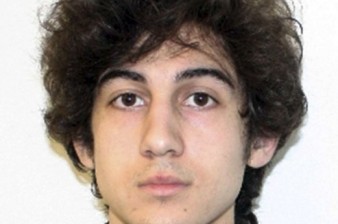
06/05/2015 10:00
Marathon bomber's lawyers give jury glimpse into family life
Lawyers for Boston Marathon bomber Dzhokhar Tsarnaev are giving the jury glimpses into his troubled family as they try to save him from the death penalty. Associated Press reports.
A psychiatrist testified Tuesday that he diagnosed Tsarnaev's father with post-traumatic stress disorder after he reported being tortured in a Russian camp during the Chechen wars with Russia in the 1990s.
Dr. Alexander Niss said Anzor Tsarnaev reported having panic attacks, flashbacks, anxiety and paranoia while he was treating him in Boston from 2003 to 2005. Niss said he also complained of headaches, dizziness, nosebleeds and other physical ailments, and during one phase of his treatment, was going to the emergency room almost every day.
"He was a sick guy," Niss said.
The testimony came during the penalty phase of Tsarnaev's trial, when the federal jury will decide whether the 21-year-old former college student should get the death penalty or life in prison for the 2013 bombings that killed three people and wounded more than 260.
Testimony was scheduled to resume Wednesday.
Tsarnaev's lawyers are hoping his background — combined with their claim that he was heavily influenced by his volatile older brother, Tamerlan — will convince the jury he does not deserve a death sentence. Tamerlan, 26, was killed days after the bombings during a getaway attempt.
Michael Reynolds, a Princeton University professor, on Tuesday described the turbulent region of Chechnya, Russia, where Anzor Tsarnaev's family had roots.
The Tsarnaev family lived in the Dagestan region of Russia, near Chechnya, and in the former Soviet republic of Kyrgyzstan before moving to the U.S. in 2002. Dzhokhar was 8 when he came to the U.S.
Prosecutor William Weinreb pointed out while cross-examining the professor that Dzhokhar had never lived in Chechnya.
Reynolds gave a history of the North Caucasus region of Russia, including Chechnya, describing its centuries of conflict with Russia. He said Chechen families are very patriarchal, with the father or oldest son having the clear role as the decision-maker for the family.
"It's expected that the younger brother will listen to the older brother," he said.








